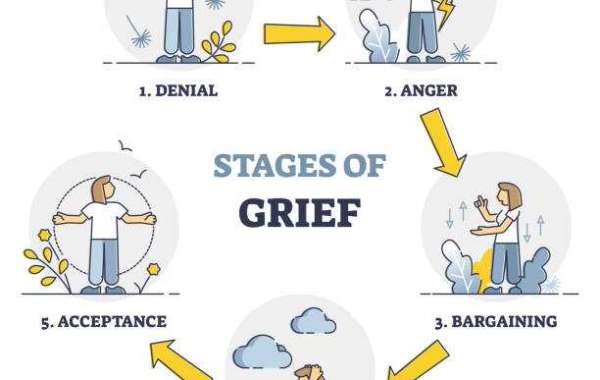Grief is a powerful, sometimes overpowering feeling that people experience, whether it is spurred on by the loss of a loved one or being told that they have a terminal illness. It could be difficult for individuals to fulfil their regular obligations while dealing with their sense of loss if they feel numb and cut off from everyday life. A normal response to loss is grief. A common and intensely individualised emotion, sorrow is sorrow. People's individual grieving processes are influenced by the many losses they suffer. Loss can occur in a variety of ways, such as the passing away of a loved ones, or dissolution of a committed relationship, the loss of a career,
The stages of grief were first introduced by psychiatrist Elisabeth Kubler-Ross in her book "On Death and Dying" (1969).
The five stages of grief are:
- Denial: This is the initial stage where the individual may deny the reality of the loss or its impact. They may have feelings of shock, disbelief, or numbness.
- Anger: In this stage, the individual may experience feelings of anger, frustration, and resentment. They may question why this has happened to them and feel like they have been unfairly treated.
- Bargaining: During this stage, the individual may try to make deals or negotiate with a higher power or even the person who has passed away. They may have feelings of guilt and try to find ways to reverse the situation.
- Depression: In this stage, the individual may experience intense feelings of sadness, hopelessness, and despair. They may withdraw from others and have difficulty finding joy or pleasure in their life.
- Acceptance: The final stage of grief involves accepting the reality of the loss and coming to terms with it. The individual may find ways to move forward and adjust to life without the person or thing they have lost.
It's important to note that not everyone experiences these stages in the same order or with the same intensity. Additionally, some individuals may experience other emotions or stages not listed here. Grief is a complex and personal process, and everyone copes with it in their own way.
Here are ten ways to overcome grief:
- Give yourself permission to experience your emotions: Grief may be a powerful and overpowering feeling. It's critical to provide oneself permission to experience and communicate your feelings.
- Ask for help from relatives and close friends: Sharing your loss with loved ones and getting their support may make you feel less isolated and help you manage your feelings.
- Join a support group: Sharing your experiences with others who are going through similar situations can be helpful in the grieving process.
- Practice self-care: Taking care of yourself physically and emotionally can help you cope with grief. This can include things like exercise, eating healthy, and getting enough sleep.
- Seek professional help: If you are struggling to cope with grief, consider seeking help from a therapist or counselor who specializes in grief and loss.
- Honor the memory of the person you lost: This can include creating a memorial or doing something in their honor.
- Find ways to express yourself creatively: Writing, painting, or other forms of creative expression can help you process your emotions and find meaning in your loss.
- Set small goals: Setting small goals for yourself can help you feel a sense of accomplishment and progress, which can be helpful in the grieving process.
- . Have compassion on yourself; mourning is a process that takes time. It's crucial to have patience with yourself and provide your body with the space and time it requires to recover.
- Remember that it's okay to ask for help: Grief can be overwhelming, and it's okay to ask for help when you need it. Whether it's from friends, family, or a professional, seeking help is a sign of strength, not weakness.
grief impact on mental health points
Mental health may be significantly impacted by grief. Here are a few ways that grieving may have an impact on one's mental health:
- Depression: Clinical depression may eventually develop as a result of the tremendous sadness, helplessness, and despair that can accompany grieving.
- Anxiety: Bereavement can result in emotions of panic and lack of control, as well as feelings of fear and worry about the future.
- PTSD: Post-traumatic stress disorder PTSD symptoms may appear if the loss was severe, such as when a loved one passed away suddenly or as a result of violence Insomnia. Grief can cause difficulty sleeping, which can lead to fatigue, irritability, and difficulty concentrating.
- Substance abuse: Grief can lead some individuals to turn to alcohol or drugs as a coping mechanism, which can result in substance abuse.
- Using the web browser on our website, you may find the best mental health experts. To find the help you need, type the appropriate term. “online counselling” or psychologist near me
- Social isolation: Grief can cause individuals to withdraw from social interactions, which can lead to loneliness and isolation.
- Guilt and shame: Grief can cause individuals to feel guilty or ashamed about things they did or didn't do before the loss, leading to negative self-talk and self-esteem issues.










